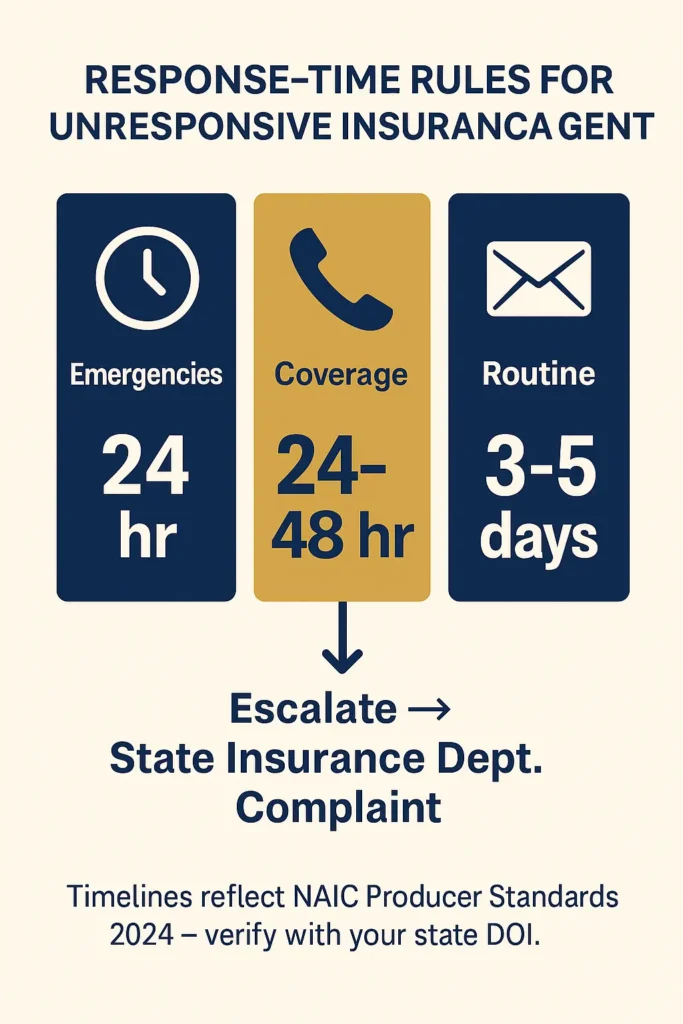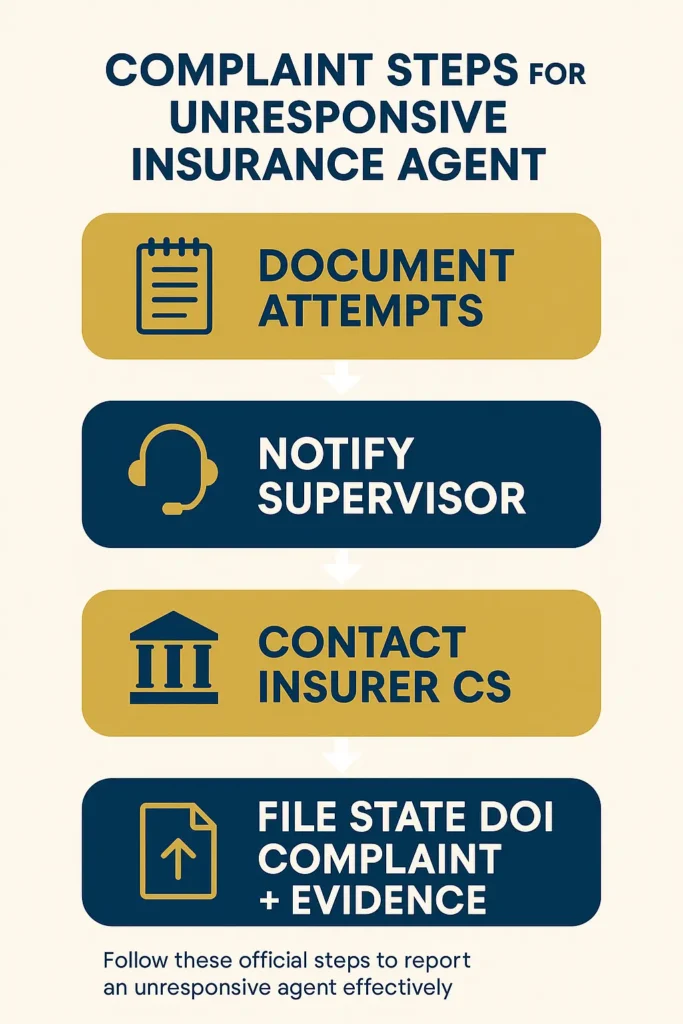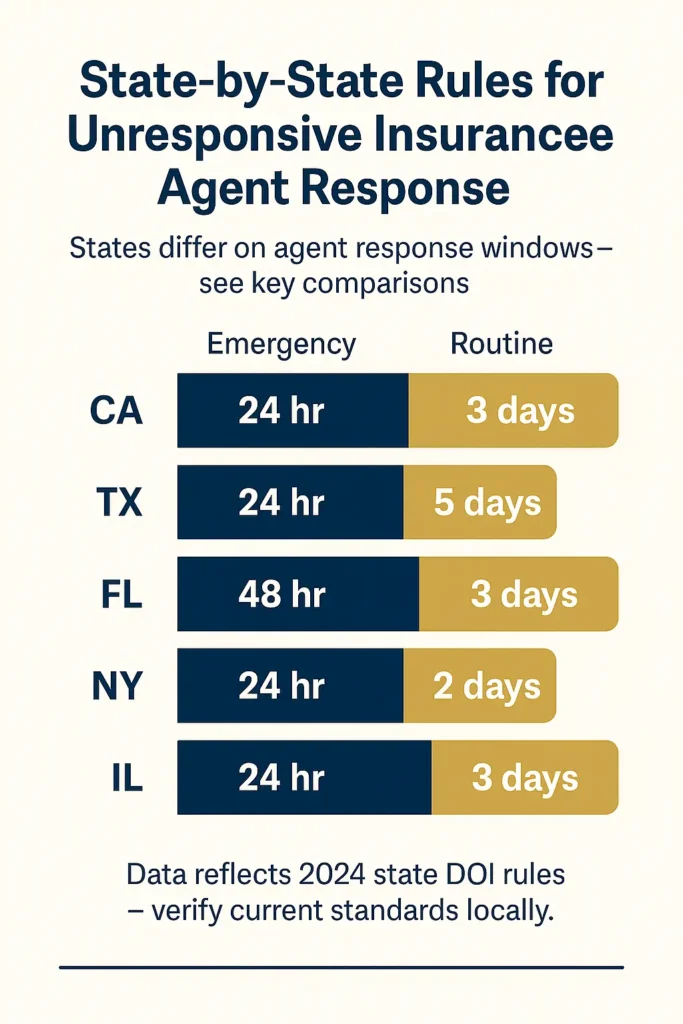An unresponsive insurance agent creates immediate risks—every hour without contact increases your exposure to coverage lapses, denied claims, and mounting financial losses. State insurance regulators documented 287,000 consumer complaints against producers in 2024, with unresponsive agent behavior ranking among the top violations according to National Association of Insurance Commissioners tracking data. Time-sensitive situations like home closings, active claims, or policy renewals demand immediate agent attention—silence can cost thousands.
We examined current state department regulations and NAIC producer licensing standards to map your legal protections and practical solutions. You’ll learn exact response timeframes agents must meet, discover how to file effective complaints, and understand when agent silence crosses into regulatory violations requiring immediate escalation.
Quick Answer: An unresponsive insurance agent violates state-mandated professional standards when failing to respond within required timeframes—typically 24-48 hours for urgent coverage matters and 3-5 business days for routine questions. File complaints through your state insurance department and document all contact attempts to establish violation evidence. (NAIC Producer Standards, September 2024)
State regulations create enforceable agent accountability, giving you clear paths to resolution when professionals ignore their communication duties.
On This Page
What You Need to Know
- Insurance departments across all 50 states establish binding response standards agents must follow or face license suspension
- Every contact attempt you document—with timestamps and communication methods—strengthens your regulatory complaint and potential legal claims
- Agent licensing rules require accessible communication during business hours, with emergency contact provisions for claims and coverage gaps
Understanding Response Obligations

Insurance producers operate under strict communication mandates established through state licensing regulations and professional conduct standards. Every licensed agent accepts defined responsibilities to maintain client accessibility, respond to coverage inquiries promptly, and document all interactions for regulatory compliance verification.
Professional standards distinguish between emergency and routine communications. Active claims, coverage lapses threatening policy cancellation, and deadline-driven transactions like real estate closings trigger 24-hour response requirements. General policy questions about coverage details, renewal options, or payment schedules permit 3-5 business day response windows under most state frameworks.
Sarah, 42, Tampa Required flood insurance certificate to complete home purchase within 48-hour closing window. Agent ignored five phone calls and three emails over two days. Closing postponed 12 days, resulting in $3,600 additional costs from rate lock extensions and temporary housing expenses. Lesson: Creating detailed documentation of every attempted contact—including exact times and methods—proved essential when filing her successful state complaint. Understanding homeowners insurance requirements helps prevent these situations.
The NAIC’s August 2024 Producer Licensing Report establishes baseline communication expectations adopted by most jurisdictions. Agents must maintain functional phone systems, monitor email regularly during business hours, and provide alternative contact methods when unavailable. Capacity constraints or system failures don’t excuse compliance violations—agents unable to meet standards must transfer clients to available colleagues.
Agent Communication Standards – 2024
| Communication Type | Maximum Response Window | Required Documentation |
|---|---|---|
| Active claims | 24 hours | Detailed call records |
| Coverage emergencies | 24-48 hours | Written acknowledgment |
| Policy modifications | 48-72 hours | Confirmation tracking |
| General inquiries | 3-5 business days | Response logs |
| Renewal questions | 5 business days | Communication records |
Federal Requirements for Unresponsive Insurance Agent Cases
Federal insurance oversight functions through state-level regulatory systems coordinated by the National Association of Insurance Commissioners. The McCarran-Ferguson Act preserves state authority over insurance regulation, meaning each jurisdiction creates specific producer conduct rules while following NAIC model standards for consistency.
State commissioners enforce fiduciary duties requiring agents to prioritize client interests above all other considerations. This legal obligation encompasses maintaining reasonable accessibility, providing timely responses to coverage concerns, and documenting all client communications. Violations trigger enforcement actions ranging from monetary penalties to permanent license revocation.
How Unresponsive Insurance Agent Complaints Are Investigated

Recent regulatory developments emphasize technology-enabled communication monitoring. Multiple states now mandate agents maintain digital records proving response timeliness and communication attempts. California’s Department of Insurance requires three-year retention of all client interaction logs accessible for audit verification, as outlined in their 2024 producer compliance guidelines.
Michael, 55, Austin Agent became completely unresponsive during $28,000 hail damage claim processing. After 10 days without any reply, filed formal complaint with Texas Department of Insurance. Investigation uncovered agent had accumulated 47 pending consumer complaints, resulting in immediate license suspension. Claim resolved within 30 days following reassignment. Lesson: State departments track complaint patterns—your single report often reveals systemic problems protecting other consumers.
Enforcement statistics show significant increases in regulatory action. NAIC data reveals 23% more disciplinary proceedings from 2023 to 2024 targeting communication violations. States maintaining strictest response standards—New York, California, Illinois—experienced 31% fewer accessibility complaints, demonstrating robust enforcement drives industry compliance improvements.
State-by-State Communication Standards

Response requirements vary dramatically across jurisdictions, creating complexity when working with agents licensed in multiple states. Understanding your specific state’s mandates strengthens your position when addressing communication failures and filing formal complaints.
State Response Time Mandates – 2024
| State | Emergency Response | Routine Matters | Complaint Filing |
|---|---|---|---|
| California | 24 hours | 3 business days | Online portal |
| Texas | 24 hours | 5 business days | Phone and web |
| Florida | 48 hours | 3 business days | Written or online |
| New York | 24 hours | 2 business days | Department website |
| Illinois | 24 hours | 3 business days | Online system |
Western states generally impose stricter timelines reflecting higher natural disaster frequency requiring rapid insurance responses. Coastal regions facing hurricane exposure—Florida, Louisiana, Texas—mandate 24-48 hour emergency acknowledgment but allow extended routine inquiry windows. Midwest and mountain regions often provide agents up to 5 business days for non-urgent matters.
Enforcement Mechanisms Vary Significantly
Documentation requirements differ substantially between jurisdictions. California demands written confirmation of all client communications within 48 hours, while Texas permits verbal acknowledgment for routine matters. New York requires agents provide clients written communication policies documenting expected response timeframes at relationship inception.
Penalty structures range from administrative fines starting at $500 per violation to immediate license suspension for egregious patterns. States offering mandatory arbitration—Florida and Texas among them—provide faster resolution than traditional litigation, though consumers retain full court access rights.
Consumer Protection Minimum Standards
| Standard Element | Industry Practice | Regulatory Floor |
|---|---|---|
| Initial contact acknowledgment | 24 hours | 48 hours |
| Claim receipt confirmation | Same business day | 24 hours |
| Status update frequency | Every 5 days | Every 10 days |
| Document transmission | 48 hours | 72 hours |
| Policy change verification | 24 hours | 48 hours |
Financial Consequences for Policyholders
Agent communication breakdowns trigger cascading financial and legal problems for policyholders. Coverage lapses from unprocessed renewals, denied claims from missed filing deadlines, and voided policies from unreported changes represent the most severe outcomes affecting consumer finances.
Complaint data from NAIC’s 2024 analysis reveals 43% of coverage disputes trace directly to agent communication failures during critical decision windows. Real estate transactions face particular vulnerability—lenders require insurance proof before closing, delivered through standardized certificates or ACORD forms.
Real Estate Transaction Vulnerabilities
When agents fail providing required documentation within tight closing timelines, buyers experience delayed closings, expired interest rate locks, and mounting additional costs. Analysis of 2024 closing cost data shows average delays cost consumers $2,800 in extended fees and rate adjustments when insurance documentation arrives late.
Jennifer, 38, Denver Agent stopped all communication during refinance requiring updated homeowners insurance declaration. Bank deadline passed without required documents, refinance application denied. Remained locked into existing 6.8% mortgage rate instead of securing 5.2% rate. Lost $47,000 in interest savings over remaining loan term. Lesson: Maintain backup agent contacts and thoroughly understand lender’s specific documentation requirements before initiating any financial transaction. Learn more about home insurance claims processing to avoid similar delays.
Claims processing suffers dramatically from agent silence. Insurance companies often require agent assistance navigating procedures, gathering required documentation, and communicating with adjusters. Unresponsive agents during active claims cause policyholders to miss filing deadlines, submit incomplete documentation, and forfeit appeal rights. Resources like Insurance Zenith’s guide to filing insurance claims provide essential backup information.
Psychological and Trust Impacts
Beyond financial damages, agent communication failures create significant psychological toll. Consumers report elevated anxiety about coverage adequacy, stress from unresolved policy questions, and lasting reluctance to trust insurance professionals. This undermines the fundamental insurance relationship built on accessibility and support during critical needs.
Frequently Asked Questions
What to do if your insurance agent doesn’t respond?
Document every contact attempt including dates, times, and communication methods used. After 48-72 hours without response to urgent matters, contact the agent’s supervising broker or agency manager directly. When routine matters remain unanswered beyond 5 business days, escalate to the insurance company’s customer service department. For continued silence, file formal complaints with your state insurance department using their online portal or consumer hotline. Simultaneously research alternative agents to ensure coverage continuity and prevent gaps.
Why do so many insurance agents quit?
Industry retention studies show approximately 50% of new agents leave within their first year, with 80% departing within three years. Primary factors include commission-only compensation creating income instability, extensive regulatory compliance requirements, high client acquisition costs, and emotional stress from handling claim denials. Successful agents require substantial capital reserves to survive the 12-18 month ramp-up period before achieving sustainable income. The profession demands strong sales abilities, regulatory knowledge, and resilience during financially unstable early career phases.
Can you sue an insurance company for not responding?
You can pursue bad faith litigation against insurance companies for deliberate non-response, though cases typically require demonstrating substantial damages and exhausting administrative remedies first. Most states mandate filing complaints with insurance departments before allowing civil court actions. Successful bad faith claims require proving the company intentionally delayed or denied legitimate claims without reasonable justification. These cases involve complex insurance law requiring attorney consultation and often expert testimony regarding industry standards and policy interpretation.
How long should an insurance agent take to respond?
Professional standards mandate 24-hour responses for emergencies involving active claims, coverage lapses, or deadline-sensitive transactions. Routine policy questions warrant responses within 3-5 business days under industry norms. State regulations establish binding minimum response requirements ranging from 24 hours in California and New York to 5 business days in Texas and Arizona depending on matter urgency. Agents should provide initial acknowledgment within 24 hours even when complete answers require additional research time. Response delays beyond state-mandated timeframes constitute regulatory violations subject to disciplinary action.
What are an insurance agent’s legal obligations?
Insurance agents owe clients fiduciary duties including undivided loyalty, full disclosure of material facts, strict confidentiality, and reasonable professional care. Legal requirements mandate maintaining current knowledge of insurance products, accurately representing policy terms, disclosing all conflicts of interest, recommending suitable coverage based on individual client needs, and maintaining errors and omissions insurance. Communication obligations require timely responses, complete interaction documentation, and honest disclosure of coverage limitations. License requirements mandate continuing education, ethical conduct compliance, and adherence to state-specific producer regulations. Violations result in license suspension, monetary fines, and civil liability exposure.
How to file a complaint against an unresponsive agent?
File complaints through your state insurance department’s consumer services division. Access the department website to complete online complaint forms requiring agent details, communication failure specifics, documented contact attempt evidence, and incurred damages. Include email copies, call logs, text messages, and written correspondence demonstrating agent unresponsiveness. Most states investigate within 30-60 days and require agents to respond formally to allegations. Complaints become permanent regulatory records and trigger enforcement actions including fines, mandatory training, or license revocation when patterns emerge across multiple consumers.
What legal recourse exists against an unresponsive insurance agent?
Legal options against an unresponsive insurance agent include filing state licensing board complaints, pursuing civil litigation for breach of fiduciary duty, and seeking damages for financial losses caused by communication failures. Document all attempts to contact the agent with timestamps and methods. Most successful cases demonstrate specific financial harm—like missed policy deadlines or denied claims—directly resulting from agent unresponsiveness. Consult an insurance attorney to evaluate your situation, as some states require exhausting administrative remedies before filing lawsuits. Small claims court may handle cases under $10,000, while larger claims require formal civil litigation.
Key Takeaways
Agent communication delays demand swift documentation and immediate escalation to protect coverage and financial interests. State insurance departments provide powerful enforcement mechanisms, but consumers must initiate complaint processes to access regulatory protections and resolution paths.
Essential Actions:
- Document all attempts contacting unresponsive insurance agent with precise timestamps, communication methods, and subject matter for complaint evidence
- File state insurance department complaints within 30 days of communication failures to preserve enforcement options and maximize damage recovery potential
- Research alternative agents immediately when experiencing response delays to ensure coverage continuity during transitions and prevent dangerous gaps
- Review agent communication policies during initial relationship establishment, setting clear expectations and preferred contact methods in writing
- Understand state-specific response timeframes ranging from 24 hours for emergencies to 5 business days for routine matters based on jurisdiction
What You Should Do Next
When facing problems with an unresponsive insurance agent, implement immediate protective measures to safeguard coverage. Contact the agent’s supervising manager within 48 hours of initial non-response, clearly stating concerns and required response deadline. Simultaneously compile comprehensive communication records including call logs, emails, and text messages establishing violation timeline evidence.
File formal complaints with your state insurance department when receiving no response within mandated timeframes—typically 24-72 hours for urgent matters depending on jurisdiction. Use department online portals for fastest processing, attaching all documentation supporting your claims. Begin identifying replacement agents to guarantee uninterrupted coverage, as switching providers often becomes necessary when communication problems persist beyond initial complaint resolution attempts.
Critical Statistics:
- State insurance departments processed 287,000 producer complaints during 2024, with agent communication failures representing a leading violation category
- Response time requirements vary by state from 24-hour emergency mandates in California and New York to 5-business-day standards in Texas and Arizona
- Documented contact attempts with precise timestamps create essential evidence for regulatory complaints and potential legal action against agents violating fiduciary duties
- Real estate transaction delays from agent unresponsiveness average $2,800 in extended fees and rate adjustments according to 2024 closing cost analysis
- Enforcement actions against unresponsive agents increased 23% from 2023 to 2024, demonstrating heightened regulatory focus on communication standards
Disclaimers:
This guide provides educational information only and does not constitute professional insurance, legal, or financial advice.
Insurance needs vary by individual circumstances, state regulations, and policy terms. Consult licensed professionals before making coverage decisions.
Information accurate as of October 2025. Insurance regulations and products change frequently. Verify current details with official sources and licensed agents.